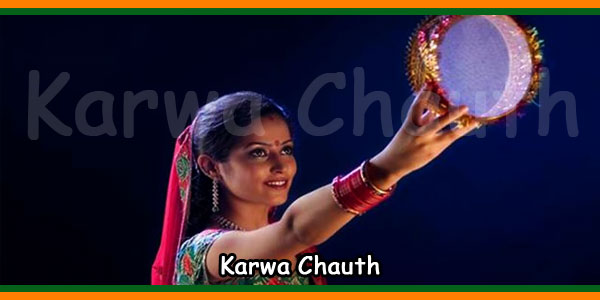Karwa Chaut is observed on Krishna Paksha Chaturthi in the Kartik month. However, it is in Ashwin month as per Amanta calendar followed in Gujarat, Maharashtra and Southern Indian states. Only the names of the months are different, but Karwa Chauth is observed on the same day in all states.
Karwa Chauth coincides with Sankashti Chaturthi, which is a fasting day dedicated to Lord Ganesha. During Karwa Chauth married women observe fast and perform rituals seeking long life of their husband. They worship Lord Shiva and His family, including Lord Ganesha, and they break the fast only after sighting moon and making offerings to the moon. Karwa Chauth fasting is observed without taking any food or water after sunrise and is concluded only after sighting the moon in the night.

Karwa Chauth day is also called as Karak Chaturthi. Karwa or Karak means the earthen pot through which water offering (Argha) is made to the moon. Karwa is a very important item during Puja and it is donated to Brahmin or any eligible woman.
Karwa Chauth is more popular in North Indian states than in south. After observing four days of Karwa Chauth, the devotees observe Ahoi Ashtami Vrat for the well-being of their sons.
Karwa Chauth Vrat Vidhi:
If you’ve seen the film Kabhi Khushi Kabhi Gham, you will relate to the concept of Sargi. A tradition observed largely by Punjabis, it is a sort of food hamper that a mother-in-law lovingly assembles for her daughter-in-law. It includes foods that one is supposed to eat early morning before sunrise on Karva Chauth. It includes nuts, vermicelli kheer and even mathri. One is supposed to enjoy these treats before sunrise and have lots of water as you can not have any food or even water until the moon-rise.
Tips for women observing Karva Chauth:
1) Include lots of fruits like banana, papaya, pomegranate, berries, apples etc. in the sargi
2) Avoid oily and fried foods like paranthas and pakoras in the morning as these are heavy and may make you dizzy. Eat a heavy meal like multigrain chapatti with vegetables or paneer.
3) Avoid tea or coffee as both of them tend to dehydrate you later in the day. Instead, drink up a glass of fresh juice, milk, buttermilk or a cup of green tea
4) Avoid mithai/ sweets and instead opt for dates, figs or apricots
5) Munch on a few nut like walnuts, almonds and pistachios
Karva Chauth Pooja
The day passes slowly but before you know it, it is evening. The women dress up and gather together to perform the puja. The katha is read aloud as the thali with a sweet, glass of water, a diya and other puja materials is passed around in a circle. All that is left now is to wait for the moon to rise.
Breaking the Fast:
Different people break the fast in different ways. The one consistent tradition is to look at your husband through a sieve and then take a sip of water from his hands to break your fast. In recent times, men also choose to fast for their wives, breaking stereotypes. Everybody then enjoys a delicious meal together.
How you break your fast.
1) Start by drinking one glass of water and then munch on a few nuts. Take a couple of almonds, one or two walnuts and a few sunflower seeds.
2) Your stomach’s acidity levels are probably already high, so avoid drinking tea or coffee. It’ll only make things worse.
3) Avoid oily, spicy and fried foods. Opt for light and easily digestible foods like idli ,dosa, uttapam with sambhar/ vegetables, dalia, oat meal chapatti with vegetables or paneer bhurji/steamed rice or pulao with dal, etc.
4) Eat some yogurt.
5) For those with a sweet tooth, you may eat two or three dates, a small piece of dark chocolate or homemade kulfi to finish off your meal.
